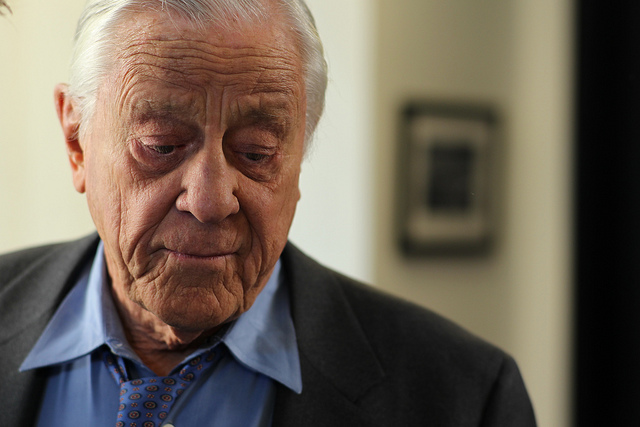Photo above: Ben Bradlee by Miguel Ariel Contreras Drake McLaughlin with Flickr Creative Commons License
By Len Lazarick
The last time I talked to Ben Bradlee he had just gotten off the elevator on the main floor of the Maryland State House and was heading to the office of Senate President Mike Miller.
He told me he was there with another gentleman to discuss something about Historic St. Mary’s City, a cause Bradlee championed after his retirement from the Washington Post.
That quick chat a couple years ago was only the second time I had a conversation with one of the greatest newspapers editors of the 20th Century. While I worked on the national copy desk of the Washington Post for eight years 1998-2006, Bradlee had long been retired, but still had an office on the quiet management floor of the paper as “vice president at large.” He would occasionally drop down to the newsroom to see old friends and colleagues, like his successor Len Downie and Bob Kaiser, who had started as an intern in Bradlee’s early years, and who eventually became the managing editor.
Kaiser, a stylist in the tradition Bradlee fostered, wrote the loving eulogy of Bradlee that began on the front page of Wednesday’s Post and ran on for four pages inside. Such an elaborate, effusive obituary (obviously prepared in advance as are the obits of many famous people) would be excessive for all but presidents. But it was Bradlee and publisher Katharine Graham who led the Post to its pinnacle years of the Pentagon Papers and then Watergate and another 17 years beyond that.
Contemplating an important front page story

Ben Bradlee by LCBGlenn with Flickr Creative Commons License https://creativecommons.org/licenses/by-sa/2.0/legalcode
There were lots of nice touches in Kaiser’s eulogy, but one of the things I liked best was the photo on page 10A of Bradlee contemplating the front page plate from Aug. 9, 1974. The Post was one of the last newspapers to hold onto hot type, and as such, the page with its metal headlines and images is in reverse, a mirror image of the black type on a white page.
It says in huge type “Nixon Resigns.” That front page plate, unlike most others, did not get recycled and melted down. It became the centerpiece of the intimate story conference room at the Post, the room where editors met every day to decide what would go in next day’s paper.
As they made those decisions in that windowless, dimly lit inner sanctum, the “Nixon Resigns” plate hung illuminated in the center of the back wall. It was flanked on both sides by the Pulitzer Prize Gold Medal for public service for the Watergate coverage and the Pulitzer citation of that award. On its face, the medal depicts Ben Franklin, one of the greatest editors of the 18th Century. The editors met in the shadow of Ben and Ben.
The St. Mary’s connection
What does all this have to MarylandReporter.com or Maryland government and politics?
It turns out Ben Bradlee had lots to do with Maryland in the final quarter century of his 93 years — not to mention the thousands of Maryland stories, big and small, that ran in the Post during his 26 years as executive editor.
He and his third wife, Sally Quinn, bought Porto Bello, a historic house across the river from St. Mary’s College of Maryland and St. Mary’s City, the original colonial capital of Maryland in the “mother county” as it is fondly called at the State House.
According to the commission’s press release Wednesday, “In 1991, the recently-retired Bradlee was ‘shanghaied’ by then-Governor William Donald Schaefer into taking the helm of a newly-reconstituted HSMC Commission, the governing body of the museum on the site of Maryland’s first capital.
“Under Ben’s leadership, the bounds and layout of the old city became visible, populated with re-constructed colonial buildings and ghost frames. Improvements to the 20th -century infrastructure, from parking to signage, provided guests a more satisfying visit. In the 90s, Ben’s influence and the recovery of three rare lead coffins from the foundation of the 1676 Brick Chapel catapulted the museum into the national news. “Ben was a great motivator,” HSMC Executive Director Regina Faden, commented, “It may be fair to say there hadn’t been this much activity in the City since the 17th century.”
Honored by Maryland Senate
For his work on the commission, Senate President Mike Miller, a great history buff, honored Bradlee with the Senate’s First Citizen award in 2004.
Bradlee was also a member of the St. Mary’s College of Maryland Board of Trustees from 2003-2011.
The college, a public liberal arts college with its own board, put out a warm press release, describing Bradlee’s service to this small institution near his weekend house.
In 1995, Bradlee wrote a wonderful memoir “Good Life: Newspapering and Other Adventures,” which revealed not only some great tales of the news business but that Bradlee was quite a writer in his own right. He was lucky to have served in what now looks like the most prosperous years of the now faltering newspaper business in the United States, and he enhanced those great decades of big staffs, big papers and big stories.
In the end, it was indeed a good life.



he was a great man, but he had the advantage of working in flush times. i dont think anybody except a free-spending billionaire could operate a newspaper now